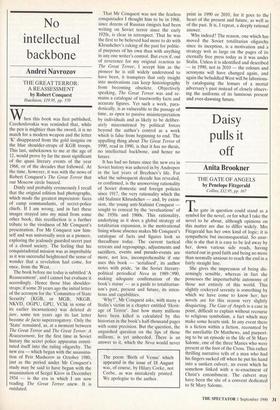No intellectual backbone
Andrei Navrozov
THE GREAT TERROR: A REASSESSMENT by Robert Conquest Hutchison, £19.95, pp. 570 When this book was first published, Czechoslovakia was reminded that, while the pen is mightier than the sword, it is no match for a modern weapon and the letter 'K' disappeared from the gold insignia on the blue shoulder-straps of KGB troops. This last, unbeknown to me at the age of
12, would prove by far the most significant of the quasi literary events of the year 1968, or of the decades that followed. At the time, however, it was with the news of Robert Conquest's The Great Terror that our Moscow circle buzzed.
Dimly and probably erroneously I recall that the original edition had photographs, which made the greatest impression: faces of camp commandants, of secret-police chiefs. If I am wrong, and in fact these images strayed into my mind from some other book, this recollection is a further tribute to the vividness of Mr Conquest's presentation. For Mr Conquest saw him- self and was universally seen as a pioneer, exploring the jealously guarded secret past of a closed society. The feeling that his conquistadorial mission was as improbable as it was successful heightened the sense of wonder that a revelation had come, for once, from the West.
The book before me today is subtitled 'A Reassessment', and I cannot but evaluate it accordingly. Hence those blue shoulder- straps: if some 20 years ago the initial letter of the acronym for the 'Committee of State Security' (KGB, or MGB, NKGB, NKVD, OGPU, GPU, VChk in some of its earlier incarnations) was deleted de jure, some ten years ago its last letter become de facto supererogatory. Only the 'State' remained, as, at a moment between The Great Terror and The Great Terror: A
Reassessment, for the first time in Soviet history the secret police apparatus consti- tuted itself into the ruling oligarchy. The new era — which began with the assassina- tion of Petr Masherov in October 1980, just as the period under Mr Conquest's study may be said to have begun with the assassination of Sergei Kirov in December 1934 — is the era in which I am now reading The Great Terror anew. It is outdated. That Mr Conquest was not the fearless conquistador I thought him to be in 1968, since dozens of Russian emigres had been writing on Soviet terror since the early 1920s, is clear in retrospect. That he was the first to be believed had more to do with Khrushchev's raking of the past for politic- al purposes of his own than with anything in any one writer's control. But even if, out of reverence for my original reaction to The Great Terror, I accept him as the pioneer he is still widely understood to have been, it transpires that only insight into motivations can keep historiography from becoming obsolete. Objectively speaking, The Great Terror was and re- mains a catalogue of trustworthy facts and accurate figures. Yet such a work, para- doxically, is as vulnerable to the passage of time, as open to passive misinterpretation by individuals and as likely to be deliber- ately misconstrued by political forces beyond the author's control as a work which is false from beginning to end. The appalling thing about The Great Terror of 1990, read in 1990, is that it has no thesis, no intellectual backbone, and hence no future.
It has had no future since the new era in Soviet history was ushered in by Andropov in the last years of Brezhnev's life. For what the subsequent decade has revealed, or confirmed, is the unswerving rationality of Soviet domestic and foreign policies since 1917, the very rationality which the old Stalinist Khrushchev — and, by exten- sion, the young anti-Stalinist Conquest sought to conceal by the 'revaluations' of the 1950s and 1960s. This rationality, underlying as it does a global strategy of totalitarian expansion, is the motivational lining whose absence makes Mr Conquest's catalogue of facts and figures look so threadbare today. The current tactical retreats and regroupings, adjustments and sacrifices, events and pseudo-events are more, not less, incomprehensible if one uses this book — 'serialised', its author notes with pride, 'in the Soviet literary- political periodical Neva in 1989-1990, making adequate confirmation of the book's status' — as a guide to totalitarian- ism's past, present and future, its inten- tions and capabilities.
'Why?', Mr Conquest asks, with many a Stalin's victim in a chapter entitled 'Herit- age of Terror'. Just how many millions have been killed is calculated by this historian in the book's half-thousand pages with some precision. But the question, the anguished question on the lips of those millions, is yet unheeded. There is an answer to it, which the Neva would never print in 1990 or 2010, for it goes to the heart of the present and future, as well as of the past. It is, I repeat, a deeply rational answer.
Why indeed? The reason, one which has moved the Soviet totalitarian oligarchy since its inception, is a motivation and a strategy writ as large on the pages of its eternally free press today as it was under Stalin. Unless it is identified and described — in 1990, not in 2010 — the colours and acronyms will have changed again, and again the befuddled West will be laborious- ly cataloguing the lemurs of a mortal adversary's past instead of closely observ- ing the uniforms of its luminous present and ever-dawning future.


















































 Previous page
Previous page